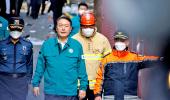Lee Jae-myung's decisive victory in South Korea's snap presidential election marks a major political shift driven by the public backlash against authoritarianism, observes Dr Rajaram Panda.

South Korea has a new President. Lee Jae-myung, the former Democratic Party chief, won the snap presidential election on June 4.
The snap poll was held on June 3 following then president Yoon Suk-yeol's ouster in April over his controversial December 3, 2024 martial law declaration.
Lee's victory marks a potential shift in South Korea's foreign policy amid rising regional and global geopolitical tensions.
With Lee's victory, the country is poised to see a new era in diplomacy as policy priorities could witness visible changes.
The poll saw the highest voter turnout in 28 years. Lee received 49.42% of the vote and finished ahead of ruling People Power Party (PPP) candidate Kim Moon-soo (41.15% and third-party contender Lee Jun-seol (8.34%).
Unlike the razor-thin margin in the 2022 presidential race, this year saw a commanding triumph for Lee, clearly highlighting popular anger against Yoon's ill-conceived martial law declaration and a clear threat to democracy.
Echoing public sentiment, Lee in his victory speech vowed to prevent any future military coup, condemning the use of arms entrusted by the people as a tool of intimidation.
He pledged to revive the economy, improve livelihoods, and work toward a peaceful Korean peninsula where co-existence is possible.

What led to the defeat of the conservatives?
Following Lee's win, the conservatives are in turmoil with a blame game escalating after the crushing defeat.
Rift widened within the PPP between the ex-president's allies and former party leader's camp.
The PPP now finds itself at a political crossroads, even as the Democratic Party of Korea (DPK) move to consolidate power over both the presidency and the national assembly.
The PPP seems to be in total disarray, with some attributing the 2017 impeachment of then president Park Geun-hye as the original cause.
Even as the PPP is embroiled in internal issues, the DPK is on fast-track mode in consolidating its position.
With 171 seats in the national assembly and control of the presidency, the DPK is expected to pass key bills previously blocked by presidential vetoes, including legislation on special prosecutions and judicial reforms.

What does DPK's victory mean for the Region?
It is likely that South Korea shall see a potential shift in its foreign policy amid rapidly evolving geopolitical tides.
Lee's populist tendencies and left-leaning ideology could lead to a significant realignment in Seoul's defence and diplomatic postures.
Some analysts fear that South Korea's alliance relationship with the United States might be undermined and a serious rift could occur as Lee might prioritise ties with Beijing and Pyongyang over the United States.
Such a policy approach could go against Washington's preference to intensify efforts to counter China's regional ambitions.
President Donald Trump will surely not rejoice at such a policy from one of America's closest allies in Northeast Asia.
If Lee chooses such a policy change, it would mean a perceptible departure from the policy pursued by his predecessor Yoon who sought closer ties with the US and elevated the alliance relationship to an unprecedented level.
Barring the aberration of Yoon's ill-conceived martial law declaration, he had firmly positioned his country's ties with the US alongside Japan in efforts to contain Beijing's regional ambitions.
It is expected that Lee is likely to adopt a measured policy and not confrontational despite his often incendiary rhetoric.
Lee is expected to recognise the importance of South Korea's traditional alliances and is unlikely to seek any major change or undermine them.
Moon Chung-in, a distinguished professor at Yonsei University and former presidential adviser, feels that Lee is a pragmatist and 'advocates a foreign policy rooted in empathy, one that respects neighbouring countries and seeks to understand their perspectives'.

The biggest worry is that Lee's anti-Japan rhetoric could disturb regional peace.
Throughout his political career, Lee has frequently criticised Japan and even referred Japan as a military adversary of South Korea.
There is a possibility that tensions with Tokyo could flare up under Lee's administration as anti-Japanese sentiment seems run deep within him.
The long-festering wartime labour issues, comfort women issue and the release of treated water from Fukushima could resurface and strain bilateral relations during Lee's administration.
While Lee is unlikely to indulge in any sudden disruptive policy, thereby drastically alter Yoon's diplomatic stance, he could pursue domestic legislation aimed at penalising those who challenge established narratives of colonial-era history.
Historians recall that under a previous left-wing administration, a special law was amended to allow criminal prosecution of those who expressed dissenting views about the May 1980 Gwangju uprising.
It is feared that a similar law in a new administration could target those who express heterodox views on issues like comfort women or wartime labour, effectively silencing voices more cordial to Japan while avoiding direct confrontation with Seoul's neighbour.
Unresolved legal issues could trouble Lee
Lee continues to face serious legal challenges that could undermine his political legitimacy.
On May 1, 2025 South Korea's supreme court overturned Lee's acquittal in an election law violation case and sent it back to the Seoul high court for retrial.
Lee's term as president could be suddenly cut short if the verdict goes against him.
The legal community remains sharply divided over whether a criminal case initiated before a presidential term can proceed once the defendant assumes office.
There is also debate about whether a conviction would force the sitting president to step down.
Aside from this, Lee faces several other criminal trials, including allegations of transferring bulk cash to North Korea through a private company during his tenure as governor of Gyeonggi province. The transfer was reportedly intended to facilitate a meeting with Kim Jong-un.

Reactions from world leaders on Lee's victory
Congratulatory messages poured in from world leaders after Lee's resounding victory, signalling a recalibrated foreign policy announcement in his inaugural address and a renewed focus on strengthening regional partnerships.
First to congratulate Lee was Chinese President Xi Jinping who said Beijing places a high priority on its relationship with Seoul.
US Secretary of State Marco Rubio sent a message, highlighting the enduring strength of the Korea-US alliance.
Rubio committed to modernising the US alliance with South Korea to confront new strategic challenges -- from supply chain resilience to regional deterrence.
Japanese Prime Minister Shigeru Ishiba congratulated Lee, calling it 'a reflection of the will of the Korean people' and expressed hope for renewed relations after years of strain between the two countries.
Both Washington and Tokyo stressed the importance of trilateral coordination, particularly in light of North Korea's ongoing weapons development and China's rising regional assertiveness.

What does Lee as president mean for India?
Prime Minister Narendra Modi too extended his congratulations to Lee and expressed the desire to work together to further expand and strengthen the India-South Korea Special Strategic Partnership.
2025 marks the 10th anniversary of the India-Korea Special Strategic Partnership.
India would look forward to engaging with the South Korean government to impart fresh momentum to further strengthen the existing bilateral ties.
Indeed, as resilient democracies and two leading economies, with shared values and interests, there are multiple areas of potential cooperation for the two countries to work together not only bilaterally but also in the regional and global context.
There are a wide range of sectors ripe for collaboration, including clean energy, resilient supply chains, defence, digital technologies, infrastructure and human resource mobility.
Dr Rajaram Panda is a former Senior Fellow at the Pradhanmantri Memorial Museum and Library, and MP-IDSA, New Delhi. He is also a former ICCR Chair Professor at Reitaku University, Japan.
Photographs curated by Manisha Kotian/Rediff and Anant Salvi/Rediff
Feature Presentation: Rajesh Alva/Rediff










